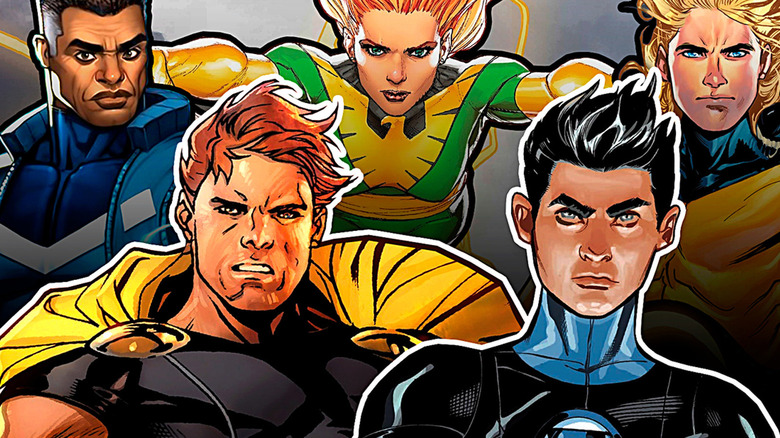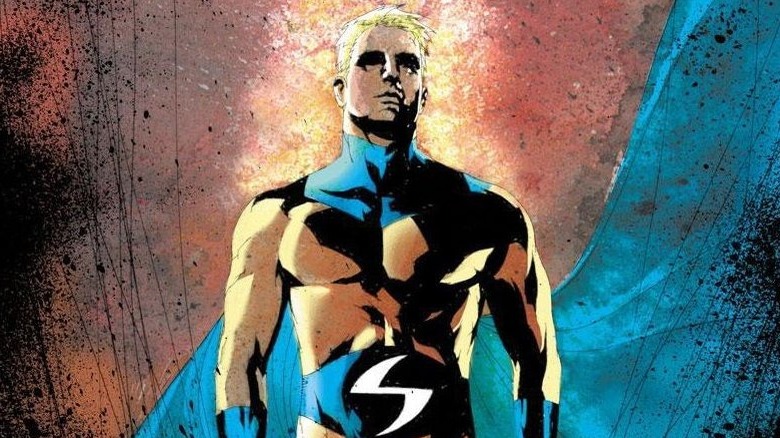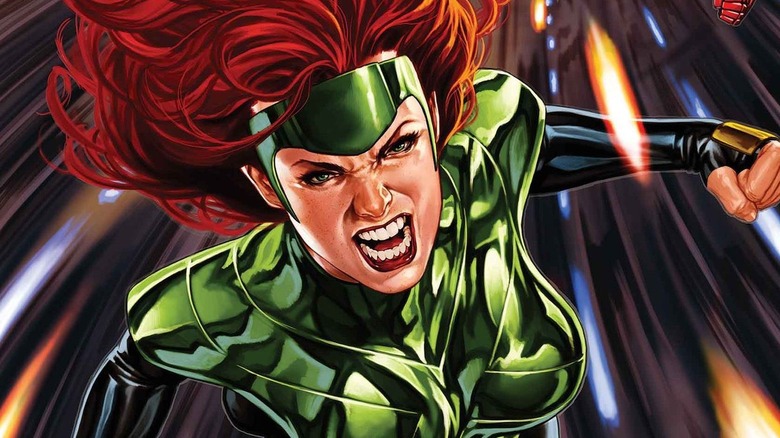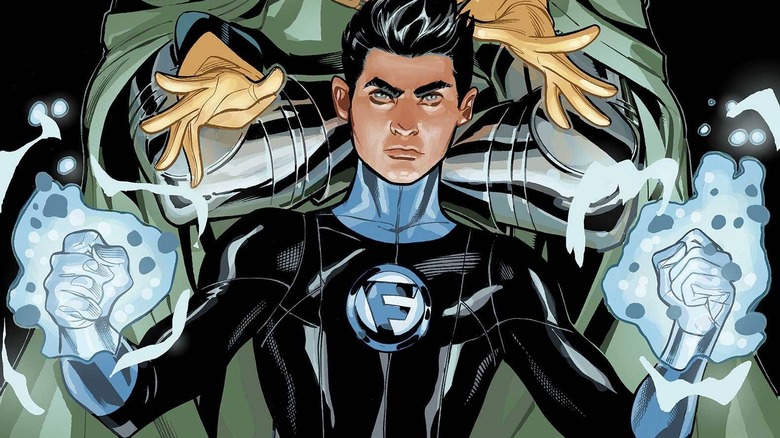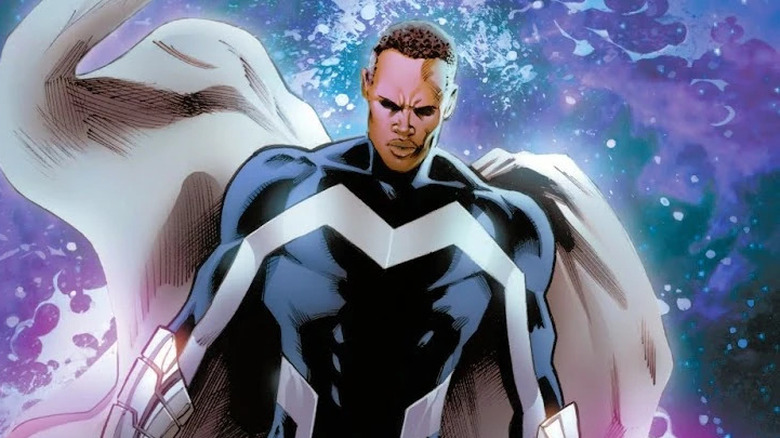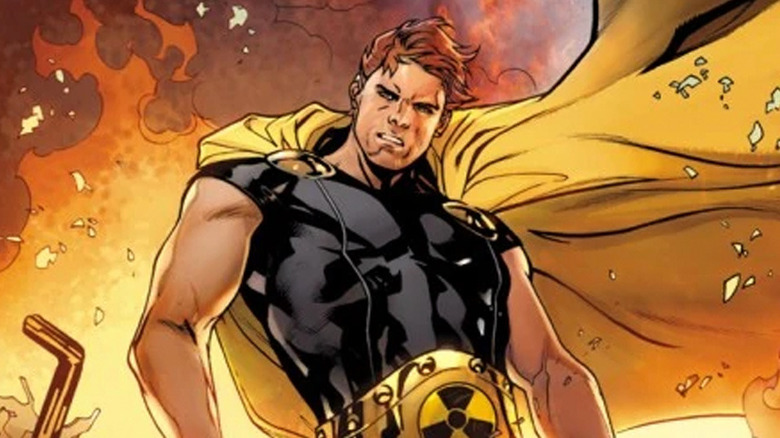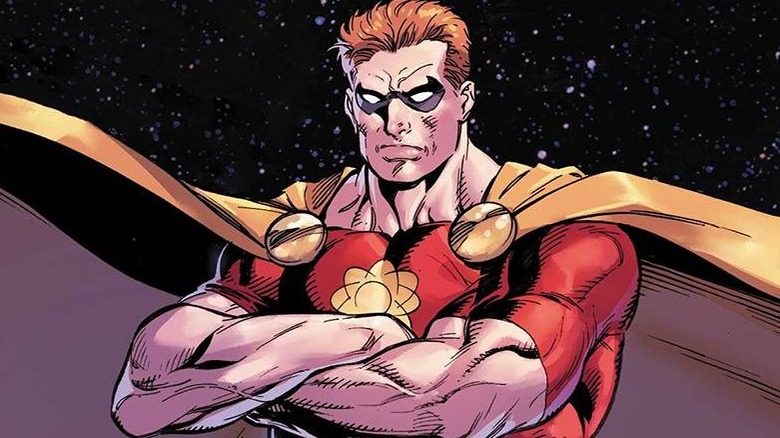The 5 Strongest Marvel Heroes Who Haven't Yet Appeared In The MCU
The Marvel Universe is exploding with powerful characters, with some heroes reaching god-like levels with their abilities. Whether they exist on Earth, in space, or a different realm or universe, characters continue to emerge from all kinds of places to make a claim as the strongest hero to date. However, not every powerful hero has debuted in the live-action Marvel Cinematic Universe.
Audiences have already been introduced to some amazingly strong heroes throughout the first five phases of the MCU. There's Scarlet Witch (Elizabeth Olsen) using her magic to rewrite reality amidst the grief of losing Vision (Paul Bettany) and Bruce Banner (Mark Ruffalo) transforming into a near-indestructible rage monster with seemingly no upper limit to his strength. Sorcerer Supreme Doctor Strange (Benedict Cumberbatch) casts spells to take on even the darkest foes, and Captain Marvel (Brie Larson) manipulates and absorbs energy on a level making her able to go toe-to-toe with just about anyone, including Thanos. You also have the Eternals, such as Sersi (Gemma Chan), Gilgamesh (Don Lee), and Druig (Barry Keoghan), ancient beings who possess a wide array of cosmic powers. There's no shortage of powerhouse heroes.
Looking ahead at the MCU, five Marvel Comics heroes of note have yet to appear on-screen. Their potential arrivals will have viewers rethinking who the most powerful heroes truly are.
Sentry is coming soon
Sentry is reportedly coming to the Marvel Cinematic Universe, with Steven Yeun set to play the complex hero in "Thunderbolts." With his potential appearance, Marvel will introduce their most powerful character, who is a danger to himself and everyone around him.
Debuting in "Sentry" #1 (by Paul Jenkins, Jae Lee, José Villarrubia, Richard Starkings, and Wes Abbott), Bob Reynolds is a drug addict who gains his incredible abilities after breaking into a government lab and drinking the Golden Sentry Serum. The experiment attempts to recreate the Super-Soldier Serum but significantly increases its potential impact on its test subject. As a result, Reynolds has the power of a million exploding suns, with a range of other powers, including molecule manipulation, god-like strength, stamina, reflexes, and near-invincibility.
However, Sentry's powers come with a dark opposite named the Void. The entity represents the evil side of Sentry, as the hero is constantly battling to keep the Void at bay. To prevent the Void from ever becoming free, Doctor Strange and other Marvel heroes make the world forget about Sentry's existence, as his bad side far outweighs the good he can do as a hero. In the process, Reynolds has forgotten his time as a hero, forced to live a normal, unspectacular life until he eventually remembers who he once was.
The "Thunderbolts" film features several notable characters on the titular team, including Ghost (Hannah John-Kamen), Taskmaster (Olga Kurylenko), Yelena Belova (Florence Pugh), Bucky Barnes (Sebastian Stan), John Walker (Wyatt Russell), and the Red Guardian (David Harbour). However, given Sentry's vast powers, the team stands little chance of taking down the out-of-control hero.
Jean Grey's powers are considerable
There are several omega-level mutants whose powers will shake the Marvel Cinematic Universe once the X-Men get a proper introduction in an upcoming film, with the seeds for their existence first planted in "Ms. Marvel" and a multiversal version of the team being seen in "The Marvels." However, few heroes are as dangerously powerful as Jean Grey.
First appearing in "X-Men" #1 by Jack Kirby, Stan Lee, and Jack Rosen, Grey, originally known as Marvel Girl, has several mighty psionic powers as an expert telepath and leader of Marvel's mutants. While her original abilities are nothing to scoff at and eclipse many of her teammates, Grey takes on the powers of the Phoenix Force multiple times, most notably during "The Dark Phoenix Saga" (by Chris Claremont, John Byrne, Terry Austin, Tom Orzechowski, and Glynis Wein), transforming her into a cosmic juggernaut corrupted into killing billions with her reality-manipulating powers. Stopping Grey without the Phoenix Force is already a difficult task. However with it, taking her down is a near-impossible mission, one which often only can succeed with casualties, including Grey herself.
Past Marvel films, including "X-Men: The Last Stand" and "Dark Phoenix," have tried to bring the classic storyline to life but haven't managed to capture the true powerhouse nature and destructive force of Grey's Phoenix or the magnitude of her transformation. While the MCU should wait on jumping into the "Dark Phoenix Saga," with enough build-up to the iconic story, the chance to finally get the arc right on the big screen is certainly possible. Even if the Phoenix never comes to be, Jean Grey alone would give the X-Men one of their strongest and most important heroes to date.
Franklin Richards isn't a normal teenager
With the Fantastic Four coming to the Marvel Cinematic Universe in 2025 in a film directed by Matt Shakman ("WandaVision"), it will be fascinating to see how soon after their introduction, the children of Reed Richards and Sue Storm follow. While Franklin Richards' powers have been the subject of considerable changes over the years, he is considered one of the most powerful mutants in existence for good reason.
Debuting in "Fantastic Four Annual #6" (by Jack Kirby, Stan Lee, Joe Sinnott, and Sam Rosen), the younger Richards is born with reality-warping powers granting him god-like abilities to manipulate molecules and matter how he sees fit. His powers make him capable of going against practically any opponent and even creating entire universes, with Franklin playing a pivotal role in restoring reality during the end of "Secret Wars" (by Jonathan Hickman, Esad Ribic, Ice Svorcina, and Clayton Cowles). However, after seemingly establishing his incredible mutant powers, Marvel nerfed Franklin post-"Secret Wars." His reality-shaping abilities were depleted, retconning his mutant heritage and explaining his ties to the X-Men were just a product of his subconscious reshaping his molecular form.
While having a hero capable of creating and erasing entire realities presents storytelling challenges with how to use a character so powerful, Marvel made a lingering mistake by taking away Franklin's most notable powers. Balancing being a kid and trying to live with god-like abilities made the character interesting, with his mutant connection adding an exciting dynamic between the Fantastic Four and the X-Men. Hopefully, whenever Franklin makes his MCU debut, the live-action universe will lean into his powers, as it's a defining trait of the hero.
Blue Marvel
Few Marvel heroes rival the pure power of Blue Marvel, first introduced in "Adam: Legend of the Blue Marvel" (by Kevin Grevioux, Matt Broome, Sean Parsons, Alvaro Lopez, John Rauch, and Dave Lanphear.) Adam Brashear's origins date back to the Kennedy administration, where the former U.S. Marine, like many cosmic heroes, gains his powers in an experiment gone wrong. The scientist's attempts to harness energy from the Negative Zone end in an explosion that transforms him. Among his long list of abilities, Blue Marvel can manipulate, absorb, and project anti-matter. He has superhuman strength and is practically invulnerable. Brashear also has a genius-level intellect and was a key part of Marvel's premiere cosmic superteam, The Ultimates.
In the final issue of his debut miniseries, Blue Marvel does what few heroes before him have: Take on the Avengers, including Sentry, and nearly come out on top. In a one-on-one matchup, Blue Marvel stands a serious chance at victory against Marvel's Golden Guardian and pretty much any other hero on this list, which is indicative of how powerful he truly is.
During the production of "The Marvels," rumors suggested he might appear in the film, with the hero's scientific and cosmic prowess fitting in well with the skillset of Captain Marvel and Monica Rambeau — both of whom were previous members of The Ultimates in the comics. That didn't end up happening, but his Marvel Cinematic Universe debut appears inevitable, with "Black Panther: Wakanda Forever" producer Nate Moore mentioning Blue Marvel as a hero he'd love to see come soon in a conversation with Deadline.
Hyperion
Hyperion, aka Marcus Milton, is Marvel's pastiche of Superman but represents a much darker reflection of his DC counterpart. Debuting in "The Avengers" #85 (by Roy Thomas, John Buscema, Frank Giacoia, and Mike Stevens), Hyperion is the leader of the Squadron Supreme, an analog of the Justice League. The hero's Eternal physiology gives him powers similar to the Man of Steel, including super strength, speed, and durability, and he also possesses heat vision and super-hearing. Like Superman, he draws his powers from the sun and is even weak against magic, with recent stories also hinting that Vibranium is his version of Kryptonite.
After initially sparring with the Avengers in a different reality, Hyperion ends up on Earth-616 following "Secret Wars," where he has been both a hero and a villain. He becomes the biggest hero on Earth when Mephisto transforms reality into a world without the Avengers during the modern "Heroes Reborn" (by Jason Aaron, Ed McGuinness, Mark Morales, Matthew Wilson, and Cory Petit) event. It is during the storyline where Hyperion brutally kills Galactus and shows off his Superman-like strength by continually taking on any foe or hero who stands against his reign of power.
If the Marvel Cinematic Universe wants to do its own take on (or even satire of) the Justice League, introducing Hyperion and the Squadron Supreme would be a fun twist on its usual approach to heroes. And if they really want to parody the past DC Universe, the fan-cast of Henry Cavill would take the comic book pastiche of Superman to an all-new level.
How did we select five heroes?
Selecting the most powerful superheroes from the Marvel Comics universe was difficult, as hundreds of characters with unique abilities deserve consideration. Obviously, the chosen heroes couldn't have yet appeared in the Marvel Cinematic Universe — but like the Sentry in "Thunderbolts," they could be appearing in future projects. Next, they had to be considered heroes at one point, even if their strongest form, such as Jean Grey's Dark Phoenix, didn't exist solely as a force of good. But they couldn't simply be a variant, as their darkest forms have to live alongside their heroic form.
The list avoided cosmic or otherworldly forces of good and balance, such as the One-Above-All, The Living Tribunal, or Eternity, in favor of heroes who have been part of traditional superteams or operated alone with heroic purpose. Additionally, it was essential to represent diverse power sets — whether they were manufactured, of mutant origin, or come accidentally. All five heroes show off different sides of the Marvel Universe that would be exciting parts of the comic book world for the MCU to shine a spotlight on next.
While we think these are five of the most powerful heroes who haven't joined the MCU yet, like most arguments regarding power sets, it's all up for debate. Ultimately, there is no definitive way to measure abilities, even if readers have ideas about how strong certain heroes are.
